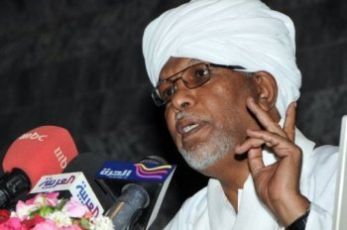Sudan’s parliament faults plan to repatriate southerners ahead of referendum
August 29, 2010 (KHARTOUM) – The speaker of Sudan’s National Assembly has described plans by the government of south Sudan to repatriate some 1.5 million southerners from the north to the south, ahead of the south’s vote on self-determination, as a violation of the referendum law and an obstruction to freedom of voting.

It is widely believed that southern Sudanese, the majority of whom are Christian or follow traditional beliefs, will opt for secession from the Arab-Muslim dominated north.
Last week, south Sudan announced a plan to organize a mass return of its citizens in the north to the south in order for them to vote in the referendum. Under the slogan “Come Home to Choose”, the plan has an estimated budget of 25 million US dollars and covers the return of some 12,200 Sudanese living in Egypt, according to a report by the BBC.
There have been fears expressed in local media that there may be reprisal attacks against the estimated 2 million southerners living in capital should the south decide to secede.
Refugees International urged South Sudan to ensure that the repatriation process is done on a voluntarily basis only.
“Humanitarian objectives should remain the goal of the repatriation process. If people genuinely want to return home, that is their right. But the Government of Southern Sudan must work together with international organizations to ensure the process is voluntary, and people should not be moved until there are enough emergency resources to receive them, such as food and temporary shelter,” said the Vice President of Refugees International, Joel Charny.
“Most of south Sudan is underdeveloped and extremely poor. Aid agencies are already taxed with making sure that the current number of returning displaced persons and refugees receive sufficient support to integrate into southern communities. International involvement is essential,” said Charny, who was recently in Sudan, on a mission looking specifically at the issue of displaced southerners in the Khartoum area. “People should not be moved, to be used as a political tool during the referendum,” said Charny
According to the head of Sudan’s National Assembly, Ahmed Ibrahim Al-Tahir, the plan is not in compliance with the referendum law.
“There is no clause or article in the referendum law indicating the move or transfer of southerners residing in Khartoum to the south so they can vote in the referendum” Al-Tahir said in statements reported yesterday by Sudan Media Centre (SMC), which is close to the northern security services.
Al-Tahir went on to say that any attempt by the SPLM, which governs south Sudan, to move southerners back is considered “an obstruction to the freedom of southerners to exercise their right safeguarded by the referendum law to vote wherever they are in all states of Sudan.”
He accused the SPLM of trying to “control all southerners in the north in a clear indication of its intention to obstruct and hinder the referendum in a non-transparent and underhanded manner by overstepping the law.”
The referendum law was passed by the parliament in December 29, 2009 after a tense stalemate over the required turnout and quorum to validate the polls. The law requires a 60% turnout of registered voters and a 51% yes vote to declare the independence of South Sudan.
Also under the law, south Sudanese living outside the south and born before January 1, 1956, the date of Sudan’s independence, must vote in the south. But south Sudanese living outside the south and born after January 1, 1956 would be able to vote in their place of residence, whether in the north or abroad.
(ST)
